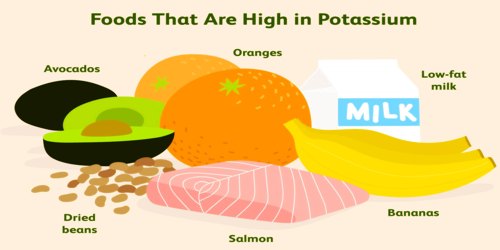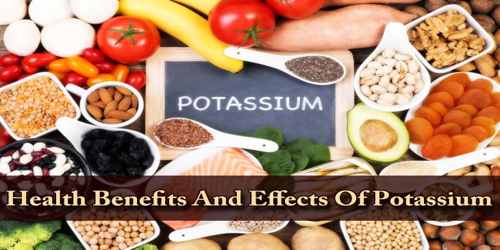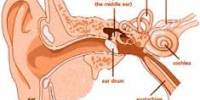Potassium is a mineral that helps control the balance of fluids in the body, and also helps the heart muscle work properly. It is an essential mineral and electrolyte that plays a critical role in many functions of the body, including regulating our heartbeat and blood pressure, proper nerve conduction, protein synthesis, glycogen (storage form of glucose) synthesis, and muscle contraction. It is one of the major minerals responsible for maintaining osmotic pressure in the center and extracellular environments.
Potassium is found naturally in most fruits, vegetables, legumes, and seeds. In healthy individuals with normal kidney function, abnormally low or high blood levels of potassium are rare.
Good sources of potassium include:
- fruit – such as bananas
- some vegetables – such as broccoli, parsnips and brussels sprouts
- pulses
- nuts and seeds
- fish
- shellfish
- beef
- chicken
- turkey

Potassium should be one of the most important parts of a balanced and nutritious diet. Citrus fruits, grains, and vegetables are the most important sources of potassium. It is also possible to get potassium in good amounts from chicken, salmon, fresh fruit juices, almonds, and whole milk. Lime beans, nuts, poultry, and potatoes also contain potassium. Nevertheless, the most significant dietary sources of potassium include coconut water, avocados, and bananas. It is important to keep in mind that cooking procedures like boiling can destroy the potassium content in foods.
Health Benefits –
Some studies suggest that higher intakes of potassium may reduce the risk of certain diseases including, stroke, osteoporosis, and kidney stones. Additionally, researchers have found an inverse relationship between potassium intake and blood pressure in those people with hypertension (high blood pressure) and low levels of potassium. People who consume a larger variety of fruits and vegetables seem to benefit the most.
Mentioned below are the best health benefits of Potassium:
Reduction of Stroke – According to the Centers for Disease Control (CDC), stroke is the fifth leading cause of death in the United States and is a major cause of serious disability in adults. We can lower our chances or prevent the risk of stroke by taking various actions.
Results from clinical control trials suggest that increased intake of potassium is associated with a decreased risk of stroke. Potassium works in the form of a vasodilator relaxing the blood vessels which helps in the free flow of blood within the body.
Regulates sugar – High levels of potassium can help in an increase in blood sugar. Maintaining normal levels of blood sugar in the body is necessary because blood sugar decreases can result in headaches, sweating, trembling, nervousness, and weakness. Immediate relief from such situations is only possible with the intake of potassium. It is only because of this reason that diabetic individuals are encouraged to maintain normal levels of potassium
Muscle contraction – Potassium plays an important role in muscle contraction. Sufficient potassium concentration is needed for proper relaxation and contraction of muscles. Potassium helps in maintaining optimal nerve and muscle function and also keeps the body reflexes fast by stimulating the neural connectivity of the brain and the muscles
Low pressure – Cardiovascular disease and low blood pressure are the results of low intake of potassium. It is always very important for people to ensure proper potassium intake as it helps in reducing the risk of cardiovascular diseases.
Kidney Stones – Abnormally high urinary calcium (hypercalciuria) increases the risk of developing kidney stones. Diets that are high in protein and low in potassium may contribute to increasing stone formation. Increasing potassium intake whether by increasing fruits and vegetables or increasing supplementation may decrease urinary calcium, hence, reducing the risk of kidney stones. In a study published in the Clinical Journal of American Society of Nephrology, researchers examined the relationship between protein and potassium intake on kidney stones.
They found that higher dietary potassium was associated with a statistically significant and large reduction in kidney stone risk in all cohorts. They also found that the type of protein consumed may also affect kidney stone risk. They suggest, “diets rich in fruits and vegetables as well as diets with a relative abundance of fruits and vegetables compared with animal protein may represent effective interventions to prevent kidney stone formation.”
Treats cramps – One of the most important advantages of having foods that are rich in their potassium content is a decrease in muscle cramps and an improvement in the strength of the muscles. Muscle aches, muscle cramps, and muscle weakness are the side effects of low levels of potassium. Potassium also helps in treating cramps which are a result of premenstrual syndrome.
Retains fluid – Fluid retention is one of the most common reasons behind cellulite formation. There are a lot of people who take in a lot of sodium but are not aware of the importance of their potassium intake. Potassium is also important because it helps in flushing out the excessive waste out of the cells. This is the reason why it is beneficial to consume foods that are high in their content of potassium as it can help in reducing cellulite formation.
Adults (19 to 64 years) need 3,500mg of potassium a day. People should be able to get all the potassium they need from their daily diet.
Side Effects –
Taking too much potassium can cause stomach pain, feeling sick, and diarrhoea. It can also cause feelings of burning or tingling, generalized weakness, paralysis, mental confusion, low blood pressure, irregular heart rhythm, or death.
Excessive intake of potassium can result in serious health issues for individuals. The deficiency of potassium in the blood is called hypokalemia resulting in abnormal heart rhythms, an increase in blood pressure, and weak muscles. Too much potassium in the blood is a condition called hypokalemia resulting in dangerous or abnormal heart rhythms.
If we are increasing our intake of fruits and vegetables, we will be increasing our intake of potassium as well as fiber. When increasing fiber, it is important to increase slowly and gradually to prevent gas and bloating. In addition, make sure to drink adequate amounts of fluids. Neglecting to hydrate properly can result in constipation and in severe cases intestinal blockage.
The most common side effects of potassium supplements include:
- Nausea
- Vomiting
- Abdominal discomfort
- Diarrhea
- Hyperkalemia (too much potassium in the blood)
Blood levels of potassium may be high or low in people undergoing dialysis. Potassium levels can be different depending on what type of dialysis is used. If any people are receiving dialysis, they may need to supplement or limit their potassium intake under the guidance of a healthcare professional.
To prevent side effects, make sure to take our supplements as prescribed, preferably with meals or liquid, to reduce gastrointestinal effects. Taking 3,700mg or less of potassium supplements a day is unlikely to have obvious harmful effects. But older people may be more at risk of harm from potassium because their kidneys may be less able to remove potassium from the blood. Older people shouldn’t take potassium supplements unless advised to by a doctor.
Uses of Potassium –
Potassium is important for normal cell respiration and the deficiency of this important mineral can result in decreased oxygen levels which further reduce the efficiency of the cell functions. Potassium in good amounts is used for regulating heartbeat, facilitating normal contraction of the muscles, and regulating the transfer of important nutrients to the cells. Potassium is also used for regulating stomach juice secretion and kidney function. One of the most important uses of this mineral in the human body is during the procedure of nerve transmission. Potassium works in the form of a cofactor catalyst activating different enzyme systems. It is therapeutically effective in different ways. It helps in treating alcoholism and acne; promoting faster healing of burns and alleviating allergies.
Information Sources:
















